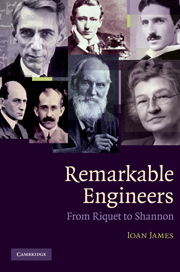Book contents
- Frontmatter
- Contents
- Preface
- Prologue
- 1 From Riquet to Watt
- 2 From Jessop to Marc Isambard Brunel
- 3 From Trevithick to Sadi Carnot
- 4 From Henry to Bazalgette
- 5 From Eads to Bell
- 6 From Braun to Hertz
- 7 From Diesel to Marconi
- 8 From Pal'chinskii to Zworykin
- 9 From Gabor to Shannon
- Epilogue
- Bibliography
- Credits
- Image credits
Prologue
Published online by Cambridge University Press: 17 December 2010
- Frontmatter
- Contents
- Preface
- Prologue
- 1 From Riquet to Watt
- 2 From Jessop to Marc Isambard Brunel
- 3 From Trevithick to Sadi Carnot
- 4 From Henry to Bazalgette
- 5 From Eads to Bell
- 6 From Braun to Hertz
- 7 From Diesel to Marconi
- 8 From Pal'chinskii to Zworykin
- 9 From Gabor to Shannon
- Epilogue
- Bibliography
- Credits
- Image credits
Summary
Most people know what an engineer is without being able to produce a definition. We say that someone has engineered the solution to a problem, and the dictionary allows this by defining an engineer as someone who contrives, designs or invents, with the same root as genius, a word whose meaning has varied much over the years. This covers not only traditional types of engineering, building bridges or railways, for example, or cars or aeroplanes, but also modern types, such as software engineering. Engineering overlaps with science, on the one hand, and with technology, on the other. There are many specialities: civil (as opposed to military) engineering, mechanical, electrical, medical, sanitary, computer, etc., are in common use. Feibleman (1961) has attempted to distinguish between these, but the distinctions matter little for my purposes. I give several examples of people who might be classified as applied physicists, others who might be regarded as electrical technologists, but they are still engineers. Although I have written about some of these engineers before (James, 2004; 2009a; b), the profiles here are not the same.
The profiles that follow are arranged chronologically by date of birth, so that when read in sequence they convey in human terms something of the way in which engineering developed. In writing this book, I had in mind the reader who, like myself, is interested in engineering but is not necessarily familiar with the history of the subject. To avoid being too discursive, I have focused in this book on certain themes.
- Type
- Chapter
- Information
- Remarkable EngineersFrom Riquet to Shannon, pp. xi - xviPublisher: Cambridge University PressPrint publication year: 2010



